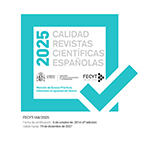¿Facilitan los proyectos institucionales de participación la capacitación política?
Resumen
La participación parte habitualmente de las bases sociales, organizadas en acciones colectivas más o menos duraderas y con desigual capacidad de infl uencia. Sin embargo, en las últimas décadas las instituciones políticas han puesto en marcha unos proyectos con el objetivo de implicar a la ciudadanía y de profundizar los hábitos democráticos de individuos y administraciones. Este artículo analiza el potencial de capacitación política de estos proyectos institucionales: si haber formado parte de los mismos cualifi ca como ciudadano activo, si aporta motivación hacia lo público, profundización (o creación) de voluntad política y habilidades para ejercerla. Se utilizan datos de un análisis comparado de cinco proyectos participativos en España y Francia lo que permite identifi car qué proyectos contribuyen a la formación de sujetos políticos y de qué modo. Finalmente, para comprender mejor esta dimensión formativa, se la compara con la de otras formas participativas que desarrollan los individuos de manera espontánea.Descargas
Descarga artículo
Licencia
La revista Política y Sociedad, para fomentar el intercambio global del conocimiento, facilita el acceso sin restricciones a sus contenidos desde el momento de su publicación en la presente edición electrónica, y por eso es una revista de acceso abierto. Los originales publicados en esta revista son propiedad de la Universidad Complutense de Madrid y es obligatorio citar su procedencia en cualquier reproducción total o parcial. Todos los contenidos se distribuyen bajo una licencia de uso y distribución Creative Commons Reconocimiento 4.0 (CC BY 4.0). Esta circunstancia ha de hacerse constar expresamente de esta forma cuando sea necesario. Puede consultar la versión informativa y el texto legal de la licencia.











